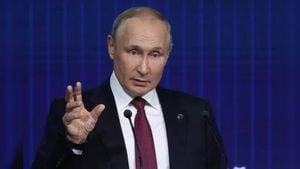At the COP29 climate summit held recently in Baku, Azerbaijan, world leaders gathered to tackle one of humanity's most pressing challenges: climate change. Amidst heated debates and passionate pledges, the focus this year centered around financing shifts to combat the mounting climate crisis, especially for developing nations. Yet, as discussions unfolded, the shadow of Donald Trump's potential second term as U.S. President loomed large over the negotiations.
Trump's unexpected re-election victory raises concerns about the future of U.S. climate policy, recalling his previous term during which he took significant steps to roll back climate regulations. Gautam Jain, a senior research scholar at Columbia University, expressed his thoughts on the matter, noting, "President Trump repealed many laws related to this, for example, the Clean Power Plan. But even then, we saw continued investments happening in utility-scale solar and onshore wind because they became cost-effective." This complex backdrop of shifting policies makes it difficult to predict how the international community will adapt.
Throughout COP29, the conversation frequently returned to the issue of how much more investment is necessary for helping developing nations adjust to climate change. Critical voices questioned which wealthier nations should step up to the plate and support those struggling the most. It’s widely acknowledged among experts and advocates alike, including Jain, the pressing need for substantial financial backing.
Complicatory factors also arose with ExxonMobil CEO Darren Woods advising Trump to maintain stability within the energy sector. This request reflects the delicate balance corporations are attempting to strike, eager to capitalize on burgeoning renewable energy markets but wary of the volatility Trump’s policies might generate. Woods argued for continuity, indicating possible reluctance from the corporate world to see sweeping changes.”
While the U.S. leadership role has been thrown under the spotlight with the specter of Trump, other world leaders incorporate their voices and actions as well. Hungarian Prime Minister Viktor Orbán stirred controversy by asserting at COP29, “We must continue advancing the green transition, but we need to maintain our use of natural gas, oil, and nuclear energy.” His sentiments contrasted glaringly with those of many EU leaders who advocate for a rapid transition away from fossil fuels.
Orbán's participation was notable, particularly as many European Union heads—such as Germany’s Olaf Scholz and France’s Emmanuel Macron—opted to skip the summit. He framed his call to maintain fossil fuel use within the ethos of protecting industry and agriculture, cautioning against “unrealistic quotas,” and presenting Hungary as ready to take on new roles within electric vehicle and energy storage development. His take reflects the divisions currently present among EU leaders when it concerns climate responsibility.
Leaders like British Prime Minister Keir Starmer have taken this opportunity to stress ambitious climate targets, signaling to the global community their commitment to fighting climate change. Starmer's push for new climate initiatives serves as both affirmation of his government’s stance and as public diplomacy aimed at reassuring stakeholders domestically and internationally.
Back on the U.S. front, the recurring theme of investment for future climate resilience is central. Many developing countries insist on the need for financing arrangements to safeguard vulnerable populations and landscapes. With aspirations to protect communities from the ravages of climate impacts, discussions at COP29 will shape the fabric of upcoming negotiations concerning responsibilities and contributions.
Patricia Espinosa, former executive secretary of the UN Framework Convention on Climate Change, highlighted the indispensable link between climate action and equity. She firmly noted, “Environmental and human rights issues are interconnected. Nations must see climate commitments not just as fiscal one-ups but as fundamental rights for populations facing existential threats.”
Indeed, the responses coming out from developing countries represent both frustrations and renewals of the promises made during earlier climate summits. Such responses aim not just to rally more financial commitment but to hold larger nations accountable for their historical contributions to global emissions.
Compounded by the shifting political climate, agreements struck at COP29 hold significant weight for future climate discourse. Countries must now grapple with aligning their domestic policies with international expectations, particularly as they now face accusations of hypocrisy if failing to self-police their environmental footprints.
Environmental advocates stress the importance of maintaining momentum amid prevailing geopolitical tensions, particularly as negotiation rooms are filled with skepticism and ambition. The idea of translating fervent promises to actionable policies remains the challenge of COP29.
Challenges loom beyond debate as negotiators seek to finalize key agreements. With the world watching closely, many hope this summit, fraught as it may be with contention and differing priorities, will yield concrete outcomes. The dialogues stirred at the summit could influence how nations pivot toward achieving real climate action and resilience strategies.
The anticipation of reaching climactic agreements remains overshadowed by political maneuverings. Questions about global leadership persist, especially for the U.S., as the future of its engagement may oscillate between progressive environmentalist ideals and regression toward fossil fuel dependency.
The theme of COP29, with discussions revolving around financing and ownership, signals this isn’t merely about aligning policies but creating new economic paradigms—ways to intertwine green development with equitable growth for all nations involved.
For many attending the conference, the discussions encapsulate hope, frustration, and urgency—a mixture prompting the necessary actions as nations proceed to outline commitments. There is little time left to waste as planetary health hangs by the thread of human decisions.
How leaders traverse the local versus the global tensions they find themselves embroiled within will determine the trajectories not just for upcoming climate talks, but will echo for generations. COP29 serves as not just another conference; it is potentially the keystone moment wherein climate action is either bolstered or undermined for years to come.
Despite uncertainties, the clarion call for action rings clear—climate justice knows no borders. The debate continues as nations balance environmental integrity with local economic needs, pushing forth strategies necessary for effective climate resilience. Leaders compelled to act must prioritize their commitments and overcome vested interests to create meaningful change.



